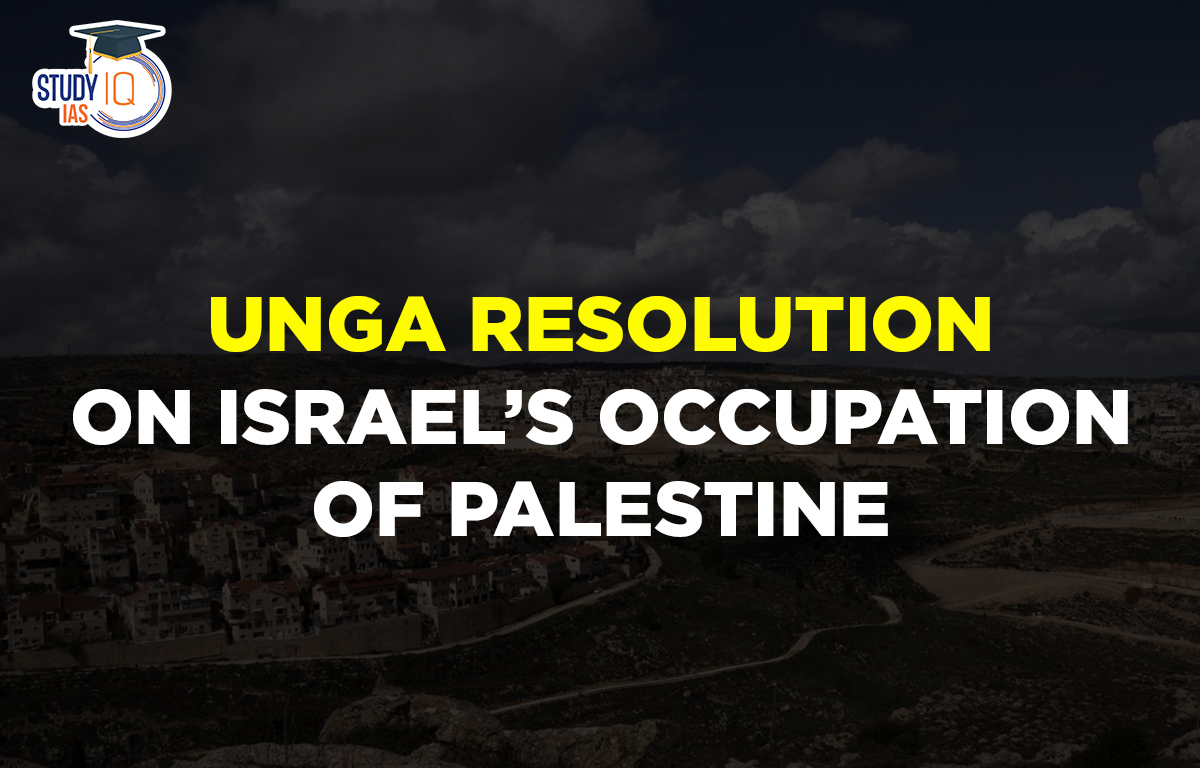Table of Contents
The UNGA Resolution

The UNGA Resolution on Israel’s Occupation of Palestine
- The resolution asks ICJ to analyse the legal consequence of Israel’s occupation, settlement and annexation including steps aimed at altering the demographic composition, character and status of the Holy City of Jerusalem.
- Countries such as the US and Israel rejected the resolution and major European powers abstained from voting. Arab countries overwhelmingly voted in favour of the resolution.
- Implications of referral: There are two possibilities when a referral is made to the ICJ, it can either lead to a settlement with a party withdrawing its case or it can lead to a trial followed by a verdict.
- While ICJ’s rulings are binding, it has no power to enforce them.
- Previous ICJ’s rulings on Israel: The last ICJ verdict regarding the issue of Israeli occupation was in 2004 when it ruled that the separation or security wall built by Israel in the West Bank was illegal.
International Court of Justice (ICJ)
- The International Court of Justice is one of the six principal organs of the United Nations.
- Functions: It settles disputes between states in accordance with international law and gives advisory opinions on international legal issues.
- Judges: The ICJ consists of a panel of 15 judges elected by the UN General Assembly and Security Council for nine-year terms.
- Seat: ICJ is seated in the Peace Palace in The Hague, Netherlands and is the only principal UN organ not located in New York City.
- Languages: Its official working languages are English and French.
Reasons for Current UNGA Resolution
- The current UNGA resolution is a result of the recent findings of the UN’s Independent Commission of Inquiry on the Occupied Palestinian Territory.
- Unlawful occupations: The 2022 report of the committee had found reasonable grounds to hold that the Israeli occupation of Palestinian territory was unlawful under international law due to its prolonged nature and the Israeli administration’s policies over the years.
- Violation of international laws by Israel: Occupation of territory in wartime by an occupying power is a temporary situation and does not deprive the occupied power of its statehood or sovereignty.
- The occupying power is not allowed to transfer its civilian population in large numbers to the occupied territory, changing its demographic composition, and exploiting the territory’s natural resources.
Findings of the Committee
- Expansion of settlements: Successive Israeli governments had ensured permanent Israeli control in the West Bank by expanding Israeli settlements and sending Israeli civilians to live in these settlements.
- Over the years, Israel has confiscated land in West Bank for military purposes and later used it for settlement construction.
- Israel supported settlements in the West Bank and Jerusalem on private Palestinian land, unauthorized outposts, and enclaves in East Jerusalem.
- Exploitation of natural resources: Israel was found to have exploited natural resources, especially fertile pastures, water resources, and agricultural and mineral-rich land in Area C controlled by Israel and restricted to Palestinians.
- West Bank is divided into Areas A, B, and C. Israel controls Area C, which makes up 60% of the West Bank.
Israel’s Occupation of Palestinian land over the Years
- Formation of Israel: Even before the state of Israel came into existence in 1948, Jewish settlers from across the world had started arriving in the former state of Palestine.
- Initially, the UNGA planned on dividing land between Israel and Palestine. This did not materialize due to opposition from Arab states.
- As British planned on departure from Palestine, Jewish leaders declared independence. This triggered the first Arab-Israel war.
- Post the first war: After the war came to an end, Israel captured more land than what was planned to be given by the UNGA.
- Historical Palestine land got divided into the State of Israel (including West Jerusalem), the West Bank (including East Jerusalem) that was taken over by Jordan, and the Gaza Strip (controlled by Egypt).
- The six-day war: Tensions between Israel and its neighbours such as Egypt, Jordan, and Syria led to the six-day war of 1967.
- During the course of the war, Israel managed to capture West Bank, the Gaza Strip and East Jerusalem, along with Golan Heights (Syria) and the Sinai Peninsula (Egypt).
- Current status: Israel returned Sinai Peninsula to Egypt and withdrew from Gaza Strip. However, it retained other captured areas of Palestinian and Syrian territory.

- Despite UNSC passing a resolution asking Israel to withdraw from the territories it seized in the war, it is yet to happen.
Key Locations
- Gaza Strip: The Gaza Strip is a Palestinian exclave on the eastern coast of the Mediterranean Sea. Together with West Bank, it forms the state of Palestine. It shares its borders with Israel and Egypt.
- West Bank: West Bank is a land–locked Palestinian territory that is bordered by Jordan and the Dead Sea to the east and by Israel to the south, west, and north.
- Golan Heights: Golan Heights (Golan Plateau) is a contested hilly area overlooking the upper Jordan River in the Levant region bordering Israel and Syria.
- Sinai Peninsula: Sinai Peninsula is a sparsely populated desert region of Egypt located between the Red Sea, the Mediterranean Sea and the Gulf of Aqaba. It is the only part of Egypt located in Asia.


 SSC CGL Exam 2025 Apply Online Starts Ap...
SSC CGL Exam 2025 Apply Online Starts Ap...
 Daily Quiz 19 April 2025
Daily Quiz 19 April 2025
 Vehicle-to-Grid (V2G) Technology and its...
Vehicle-to-Grid (V2G) Technology and its...





















